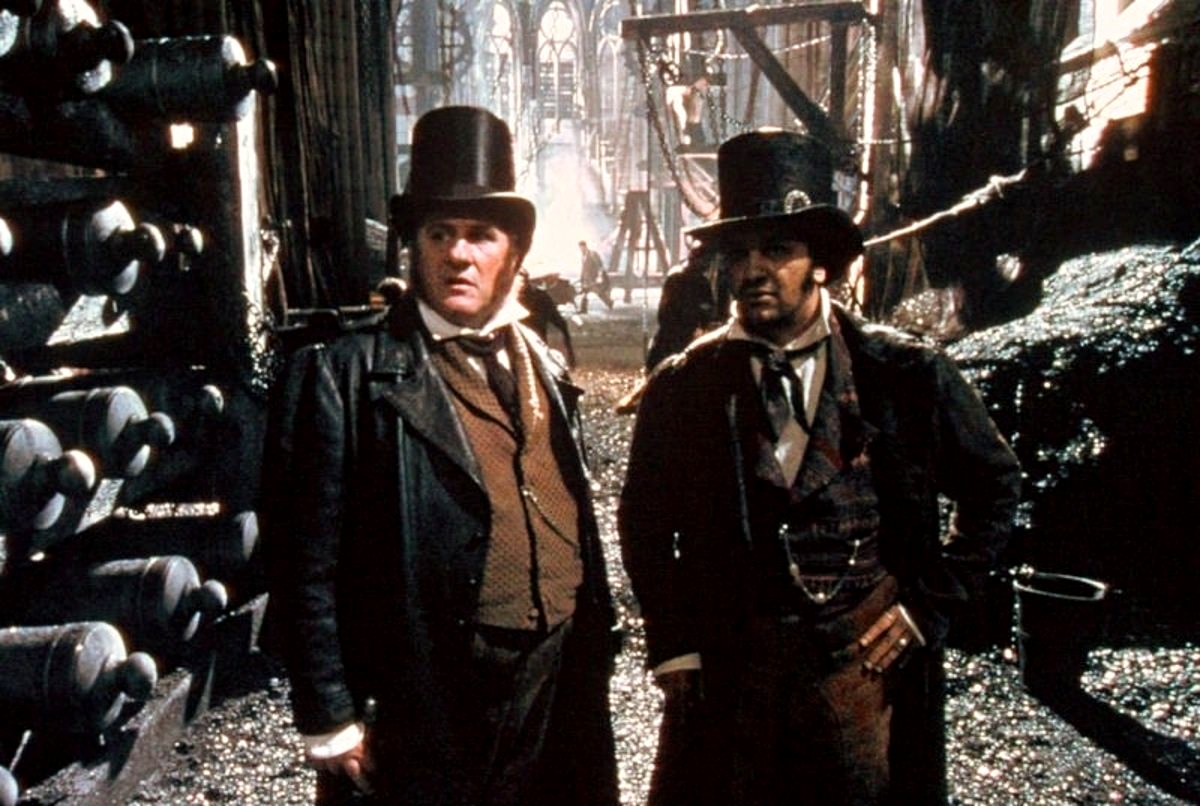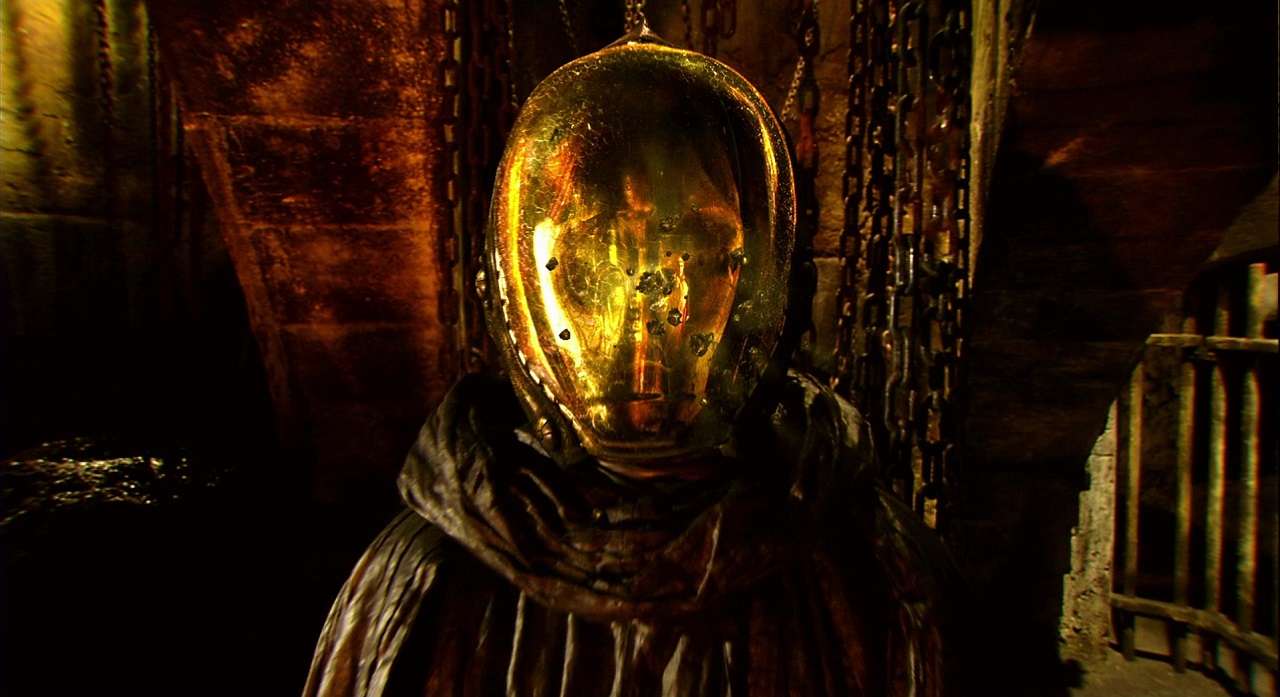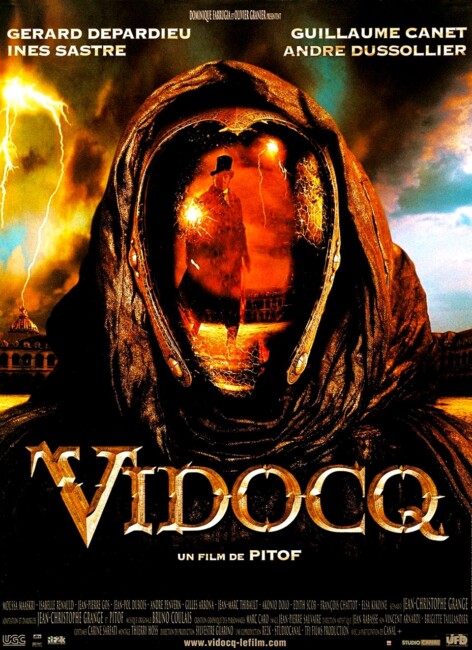aka Dark Portals: The Chronicles of Vidocq
Crew
Director – Pitof, Screenplay – Jean-Christophe Grange, Adaptation/Dialogue – Jean-Christophe Grange & Pitof, Producers – Dominique Farrugia & Olivier Granier, Photography – Jean-Pierre Sauvaire, Music – Bruno Coulais, Digital Effects Supervisor – Pascal Giroux, Alchemist’s Mask Effects – Mac Guff Ligne (Supervisor – Rodolpho Charrier), Special Effects – Les Versaillais, Production Design – Jean Rabasse. Production Company – StudioCanal/RF2K Productions/TF1 Films/Canal +.
Cast
Gerard Depardieu (Francois Vidocq), Guillaume Canet (Etienne Boisset), Moussa Maaskri (Nimier), Ines Sastre (Preah), Andre Dussollier (Police Chief Lautrennes), Jean-Pierre Gos (Tauzet), Isabelle Renaud (Marine Lafitte), Edith Scob (Sylvia), Jean-Paul Dubois (Louis Belmont), Andre Penvern (Simon Veraldi), Gilles Arbona (Ernest Lafitte), Francois Chattot (Frossard)
Plot
Paris, 1830. Francois Vidocq is an escaped convict who became the police chief of Paris but then retired to become a private detective. Vidocq is in pursuit of a suspect who wears a mirrored mask and has supernatural powers. The chase leads down into the tunnels beneath a glass foundry but during their fight Vidocq falls to his death in the furnace. Paris is shocked by the news of Vidocq’s death. Nimier, Vidocq’s partner in the detective agency, is visited by young Etienne Boisset who claims to be Vidocq’s biographer. Etienne wants to find the identity of Vidocq’s murderer and pushes Nimier to retell the events of the previous week. Nimier tells how he and Vidocq were hired to investigate the deaths of two arms manufacturers by freak lightning bolts. Vidocq believed that the killer had created a device that fired electricity and had implanted metal in the victims clothing to attract it. Etienne now follows the path of Vidocq’s investigation, uncovering the victims’ attempts to procure virgins. However, as Etienne digs deeper, it turns out that this was not for the purpose of perversion but that the dead men were operating on the instructions of the mysterious mirror-masked figure known as The Alchemist who had promised them the secrets of immortality.
Vidocq is an extravagant dark fantasy film from France. The great surprise one discovers it that the film is based on an actual historical figure Eugene Francois Vidocq (1775-1857). Even without the fantasy elements that are added by the film, the life of the real Vidocq would have for a fascinating story in its own right – indeed, Vidocq’s early life served as the inspiration for the character of Jean Valjean in Victor Hugo’s Les Miserables (1862). Between the 1790s and 1809, Vidocq was convicted of various crimes and made a number of ingenious escapes from jail. In 1809, tiring on life on the run, he began to work as an informer for the police. In 1812, Vidocq formed a unit that later became the Sûreté where he employed a number of former criminals as detectives and formulated many of the investigative techniques used today. This had great success and Vidocq later received a pardon for his crimes from the king. In 1833, Vidocq formed the world’s first private detective agency, again employing the services of former criminals. In his retirement, Vidocq wrote several books that heavily fictionalised his adventures. Vidocq became the model for Edgar Allan Poe’s August Dupin, the first fictional private detective, which in turn influenced Arthur Conan Doyle in creating Sherlock Holmes.
There have been several non-fantastic films based on Vidocq’s life with the silent French serial Vidocq (1922), the French sound film Vidocq (1938), the Hollywood production A Scandal in Paris (1946) directed by Douglas Sirk with George Sanders as Vidocq, the French The Cavalier of Croix-Mort (1948) and two French tv series Vidocq (1967) and The New Adventures of Monsieur Vidocq (1971-3). The film here is not concerned with the historical Vidocq, although a potted account of his life does pass by as a series of headlines beneath the opening credits. Rather, director Pitof takes Vidocq’s life as a leaping off point for a wholly fantastical tale. 19th Century Paris is conceived as a gorgeously extravagant alternate world – akin to The City of Lost Children (1995) combined with the serial adventures of Louis Feuillade.
To his parents, Pitof might otherwise be known as Jean-Christophe Comar but he adopted the Pitof moniker from a childhood nickname. Pitof started off in the industry supervising visual effects for music videos and French fantastic films like Delicatessen (1991), Les Visiteurs (1993), The City of Lost Children, Alien: Resurrection (1997), Asterix and Obelix vs Caesar (1999) and The Messenger: The Story of Joan of Arc (1999). Pitof made his directorial debut with Vidocq, although the film that was always be associated with his name is the disaster of the Halle Berry starring Catwoman (2004). This is a shame in that Vidocq and Catwoman exist at almost completely opposite poles in terms of quality. Catwoman might well have done any director’s career in and it took a few years for Pitof to bounce back with the Romanian-made fantasy film Fire & Ice (2008) by which time he had taken to dropping the name Pitof and going by his given name. He has directed nothing since that.


Vidocq feels like the filmed equivalent of a graphic novel – it takes place entirely in a designer world where the exteriors come with airbrushed skies and tinted fields. It is a film that has been made for the pure love of luxuriantly fantastique visuals. One of the most striking images is The Alchemist with his mirrored facemask – in one scene, he kneels over a person so they can see their own face reflected as he slits their throat. There is an extraordinary scene where Gerard Depardieu races across a piazza (one that exists entirely as a digital insert) to snatch the hat off a man’s head and toss it up into the air, just as it is hit in midair by the lightning bolt, followed by Depardieu pursuing The Alchemist around the parapet of a cathedral and into a bell tower where The Alchemist opens his cape to unleash a flock of birds at him.
The sets come with an amazing degree of baroque ornamentation. In an alleyway of prostitutes, we encounter a juggler who walks about with a miniature trapeze on his back upon which a toy devil figure tumbles; in one of the brothels, Guillaume Canet encounters a silhouette of lovers behind a curtain, which turns out to be an intricately built clockwork machine that simulates coupling motion. Pitof even shoots aerial shots looking down on rooms where the carpets and tiled floor have been arranged simply for the extravagant patterns they make. The venture down into The Alchemist’s lair is an amazing piece of production design that travels through dank oozing tunnels lit only by torchlight into a rickety laboratory filled with a maze of wooden platforms, where candles hang from ornate censers and vast sleeves of skin hang from the roof dripping red ichor and are revealed to have bodies inside.
The film reaches an improbable twist ending, particularly when it comes to revealing the identity of The Alchemist. Jean-Christophe Grange has pulled a detective story twist not unakin to the same deceptive narrator identification twist that we had in Angel Heart (1987). This is somewhat of a cheat as it reveals The Alchemist to be someone more mundane than all the build-up has led one to believe. Indeed, the mundane revelation of The Alchemist’s identity never explains how he is able to do various things like teleport about or materialise flocks of birds from inside his cape. There is however an amazing climactic fight where Vidocq uses a hall of mirrors to release The Alchemist’s trapped souls.
You can see what the producers hoped to achieve by bringing Pitof to America to make Catwoman – and you can guarantee that if Catwoman had been made with the fervidly charged style and atmosphere that Vidocq has it would have been a classic. Quite how Pitof could go from a visually stunning work like Vidocq to a film like Catwoman that ended up being laughed off screens and won multiple Golden Raspberry Awards year it came out is hard to understand. (To Pitof’s credit, he claims that the producers of Catwoman dumped his much more fantastical version). I dismissed Pitof after watching Catwoman, but after seeing Vidocq, one would be most interested in seeing what else he is capable of doing.
(Nominee for Best Production Design at this site’s Best of 2001 Awards).

